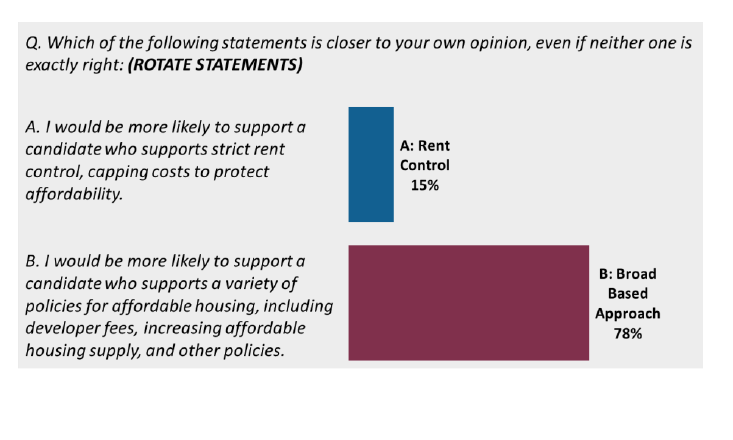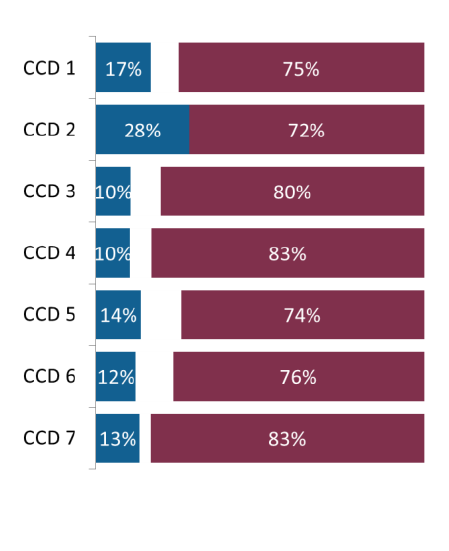Pollster Says Rent Control Not Top Priority for Seattle Voters

1. A new poll from EMC Research found that when it comes to affordable housing policy, 78 percent of voters would support a candidate who advocates "a variety of policies" (the question called out two policies specifically—developer fees and increasing housing supply).
EMC, which is affiliated with mayor Ed Murray, juxtaposed the affordable housing question against this specific question: "I would be more likely to support a candidate who supports strict rent control, capping costs to protect affordability."
Only 15 percent of voters polled went for that option.

However, the question that found strong support for the broader approach certainly doesn't exclude rent control from the "variety of policies." And, there aren't any candidates advocating rent control as the sole answer to the housing affordability squeeze.
Rent control poster child, socialist city council member Kshama Sawant, for example, who's up for reelection this season (and is Murray's rival in the current political landscape), also supports developer fees and increasing housing supply with municipal bonds.
Council candidate Jon Grant, the former head of the Tenants Union, is another outspoken supporter of rent control. But he too favors other policies such as developer fees. He's running against city council president Tim Burgess who "doesn't favor classic or traditional rent control," he tells me, but does support developer fees; Burgess was one of seven council members who voted for council member Mike O'Brien's linkage fee resolution—a $22 fee on downtown developers to help fund affordable housing—earlier this year.
Burgess tells me he "favor(s) increasing the number of rent restricted units in Seattle." He goes on: "We get these rent restricted units when government funds are used to acquire or build housing and through programs like the multifamily tax exemption program. We have about 32,000 rent restricted units in Seattle already and we need more."
As for rent control, the poll, which didn't even mention that the policy is illegal under current state law, seems to indicate that rent control isn't a top priority for voters.
The poll also broke down the juxtaposition between a "broad based" approach and a candidate who supports rent control—again, the phrasing doesn't make the options mutually exclusive—in all seven neighborhood district races. Sole support for rent control is not a winning option. (Blue is rent control, maroon is broad based.)

(Sawant is in District Three. Burgess is in an at-large district—District Eight.)
The poll also found, somewhat surprisingly, that housing affordability is dwarfed by transportation issues when it comes to top voter concerns. In an open-ended question asking voters to name "the most important problem facing the city today that the city needs to address," transportation topped the list at 40 percent. Housing came in second at 17 percent.
EMC's summary points out: "Only 2 percent of likely voters mention rent control."
The poll of 450 likely Seattle voters was conducted June 10 through 15.
2. Speaking of Burgess versus Grant, I forgot to mention that the 43rd District Democrats, who botched the endorsement in that citywide race (District Eight) last month with a vote miscount, took it up again earlier this week. The first time around, the group had incorrectly included another District Eight candidate, indie rock musician John Roderick, in the second round—preventing any of the candidates from getting enough votes, 60 percent, for a win.
At this week's do-over between just Burgess and Grant, Grant got 56 votes, Burgess 55, and "no endorsement" got eight votes. Since no candidate scored the necessary 60 percent again, the 43rd isn't making an endorsement in the race.
With Grant trying to take out Burgess from the left, the near deadlock between Burgess and Grant actually bodes well for Burgess. To wit: Sixty-seven percent of the lefty 43rd went for "no endorsement" in the District Three race starring Socialist Alternative Sawant; she's not a Democrat, and so the bylaws prohibit a Sawant endorsement, making "no endorsement" the default Sawant vote.




